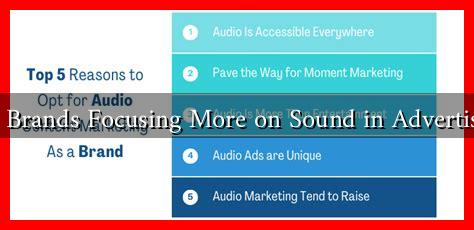-
Table of Contents
Are Brands Focusing More on Sound in Advertising?
In the ever-evolving landscape of advertising, brands are increasingly recognizing the power of sound as a critical component of their marketing strategies. From jingles to sound logos, the auditory elements of advertising are becoming more sophisticated and integral to brand identity. This article explores the growing emphasis on sound in advertising, examining its effectiveness, trends, and notable examples.
The Science Behind Sound in Advertising
Sound has a profound impact on human emotions and behavior. Research indicates that auditory stimuli can evoke memories, influence perceptions, and even drive purchasing decisions. According to a study published in the Journal of Advertising Research, ads that incorporate sound elements can increase brand recall by up to 30% compared to those without sound.
Key reasons why sound is becoming more prominent in advertising include:
- Emotional Connection: Sound can create an emotional resonance that visual elements alone may not achieve.
- Brand Recognition: Unique sound logos or jingles can enhance brand recall and recognition.
- Engagement: Auditory elements can capture attention and keep audiences engaged longer.
Trends in Sound Advertising
As brands continue to innovate, several trends have emerged in the realm of sound advertising:
- Sound Branding: Companies are investing in creating distinctive audio identities. For instance, the Intel “bong” and the NBC chimes are iconic examples of sound branding that have become synonymous with their respective brands.
- Podcasts and Audio Content: With the rise of podcasting, brands are leveraging audio storytelling to connect with audiences. Companies like Spotify and Audible are leading the charge by integrating ads seamlessly into their content.
- Interactive Audio Ads: Brands are exploring interactive audio ads that allow listeners to engage with the content. For example, voice-activated ads on platforms like Amazon Alexa enable consumers to respond directly to brand messages.
Case Studies: Brands Leading the Way
Several brands have successfully harnessed the power of sound in their advertising campaigns:
- Coca-Cola: The brand’s “Taste the Feeling” campaign utilized a catchy jingle that resonated with consumers, reinforcing its brand message and enhancing recall.
- Apple: Apple’s use of sound in its product launches and advertisements, such as the iconic “ping” sound when receiving a message, has become a hallmark of its brand identity.
- McDonald’s: The fast-food giant’s “I’m Lovin’ It” jingle is a prime example of how a simple melody can create a lasting emotional connection with consumers.
The Future of Sound in Advertising
As technology continues to advance, the future of sound in advertising looks promising. Brands are likely to explore new avenues, such as:
- Artificial Intelligence: AI can analyze consumer preferences and tailor sound experiences to individual listeners, creating personalized advertising.
- Augmented Reality (AR) and Virtual Reality (VR): These technologies will allow brands to create immersive sound experiences that engage consumers in new ways.
- Increased Focus on Accessibility: Brands will need to consider how sound can enhance accessibility for individuals with disabilities, ensuring that auditory elements are inclusive.
Conclusion
In conclusion, the focus on sound in advertising is not just a passing trend; it is a strategic approach that leverages the emotional and cognitive power of auditory elements. As brands continue to innovate and adapt to changing consumer preferences, sound will play an increasingly vital role in shaping brand identities and driving engagement. By understanding the science behind sound and embracing new technologies, brands can create memorable and impactful advertising experiences that resonate with their audiences.
For more insights on the role of sound in advertising, you can explore resources from the Advertising Research Foundation.

